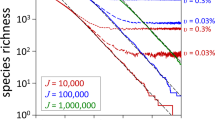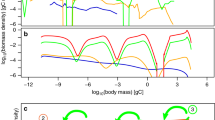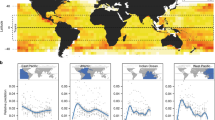Abstract
Hardy and Gunther1 and Harvey et al.2 have proposed somewhat opposing hypotheses in explanation of a phenomenon widely observed in the sea, namely, an inverse correlation in catches of zooplankton and phytoplankton. Hardy's hypothesis, that of "animal exclusion", is supported in some degree by the experimental work of Lucas3; and Harvey's, of the "grazing effect of zooplankton", by various observations on rates of feeding, and statistically by Fleming4 and others.
This is a preview of subscription content, access via your institution
Access options
Subscribe to this journal
Receive 51 print issues and online access
$199.00 per year
only $3.90 per issue
Buy this article
- Purchase on Springer Link
- Instant access to full article PDF
Prices may be subject to local taxes which are calculated during checkout
Similar content being viewed by others
References
Hardy, A. C., and Gunther, E. R., "Discovery" Rep., 11, 1 (1935).
Harvey, H. W., Cooper, L. H. N., Lebour, M. V., and Russell, F. S., J. Mar. Biol. Assoc. U.K., 20, N.S., 407 (1935).
Lucas, C. E., J. Cons. int. Explor. Mer., 11, 343 (1936).
Fleming, R. H., J. Cons. int. Explor. Mer., 14, 1 (1939).
Allen, E. J., and Nelson, E. W., J. Mar. Biol. Assoc. U.K., 8, N.S., 421 (1910).
Author information
Authors and Affiliations
Rights and permissions
About this article
Cite this article
BAINBRIDGE, R. Movement of Zooplankton in Diatom Gradients. Nature 163, 910–911 (1949). https://doi.org/10.1038/163910b0
Issue Date:
DOI: https://doi.org/10.1038/163910b0
Comments
By submitting a comment you agree to abide by our Terms and Community Guidelines. If you find something abusive or that does not comply with our terms or guidelines please flag it as inappropriate.



